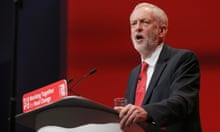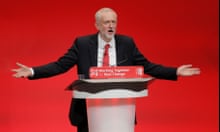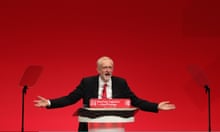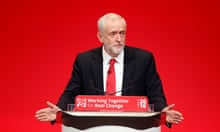Jeremy Corbyn has relaunched a leadership that was staring into the abyss. Consider what has happened since he last took to the podium at Labour conference. Britain voted to leave the EU, a prime minister who seemed unassailable was toppled, Jo Cox was brutally killed, and Labour collapsed into its worst internal crisis since its foundation. Corbyn’s speech yesterday had two key aims: to bring a divided party together and to appeal to a public that regards Labour’s current situation as a baffling mess. He is a leader who has sustained a relentless media onslaught and a revolt from almost the entire parliamentary party. Perhaps Elton John’s I’m Still Standing would have been an appropriate song to welcome the re-elected Labour leader to the stage.
He could have been weakened. Instead the greatest leadership crisis ever endured by any mainstream politician has left him more assured and confident. Corbyn has acknowledged his failures in communication, and the more fluent speaking style we saw on Wednesday demonstrated a genuine attempt to rectify them. One of the principal functions of a leader’s speech is to throw punches at opponents that actually land, and that was essential here.
Amid Labour’s civil war, scrutiny of a Conservative party shifting to the right and ridden with its own divisions has dissipated. Theresa May was allowed to raid the rhetoric of the left – social justice, fairness, building a society in the interests of the many – while lurching off to David Cameron’s right.
“Who seriously believes that the Tories could ever stand up to the privileged few?” asked Corbyn to incredulous laughter. “They are the party of the privileged few, funded by the privileged few, for the benefit of the privileged few.” He is hitting the mark, for this is not simply the view of Labour’s faithful: polls have shown this is exactly what most voters think.
A recurring critique by Corbyn’s opponents is that he simply isn’t interested in Labour winning elections. Here was an attempt to challenge a false dichotomy. Yes, protest and campaigning plays a crucial role – but Labour’s purpose, above all else, is “about winning power in local and national government to deliver the real change our country so desperately needs”.
When he spoke of Labour’s proposals on the economy, it was technical but none the worse for that. The left’s perennial weakness is appearing amateurish, prizing slogans over substance. There were concrete proposals: a national investment bank, investment in infrastructure, a new settlement for business. With self-employed people set to eclipse the number of public sector workers, finally there was a bold appeal for their support: a recognition that they value their independence, but not the insecurity, with an offer of social security and the finance to allow “successful innovators” to “grow their businesses and generate employment”.
Most striking perhaps, was the determination to tackle head-on an issue that has dogged his leadership since his very election: patriotism. Patriotism is not a concept that many metropolitan leftists are terribly comfortable with. They regard it as a euphemism for bigotry, xenophobia and imperialism. But to millions of working-class English people (Scotland and Wales are well served by their respective patriotisms), it matters a lot – and they feel the left is contemptuous about it. This was a speech infused with patriotism. “A Labour government will never accept second best for Britain” must become a line repeated ad infinitum. There was a patriotic case for tax justice: “There is nothing more unpatriotic than not paying your taxes – it is an act of vandalism.”
And there was calibration. A passionate defence of migrants was balanced with an acknowledgement that concerns over immigration must be acknowledged. The referendum result was accepted – Labour is toast in many of its natural constituencies if it does anything else – and now the party wants a just Brexit.
Though one good speech is not enough on its own, there is now a platform that can be built on. Labour’s woes are not all the product of the machinations of the mainstream media (who are not going to change their ways) or the parliamentary party (who are not a homogenous bloc). The leadership team, which did not expect to win last year, made mistakes in communication and strategy that cut through and caused damage. That damage must be undone if Labour is not to suffer the sort of election rout that would discredit the left for a generation.
Much of it was aimed at the faithful. That’s fine, for few outside that group will watch the whole performance. But the focus – indeed the fixation – must be on building broader appeal. Labour has long haemorrhaged support among older people – how will it reverse a trend fatal to its political prospects? Its economic policies are becoming much clearer to wonks. The task now is to make the way forward clear to voters, in ways that can be digested on the doorstep. What exactly is its vision for, say, someone on £25,000 living in small-town Britain?
The rhetoric will certainly rouse the hundreds of thousands who have flooded into the party, but still it may feel alien to millions. Labour’s leadership must now use this speech as a launchpad to develop a clear, coherent, optimistic vision for the Britain they want to build. Concise messages that hammer away at viable solutions should be repeated as mantras – just as the Tories do so successfully.
There is hope, for what appeared impossible just weeks ago – uniting the party – seems far more achievable. There have been fewer harsher critics of Corbyn than John Woodcock. He praised a “well-delivered speech … with a firm direction”. In the afterglow, sceptical MPs may well feel reassured enough to retake their shadow ministerial posts. There can and should be compromise, for in truth, the ideological divisions are less profound than they were in the 1980s. The bigger concerns, MPs will tell you, are competence, priorities and effective communication.
Labour has endured a summer of pain, but if that sorry period has forced leaders to confront their weaknesses, it could ultimately be to their advantage. After Liverpool, there is a moment for clarity. All sides must seize it. Together they will decide whether the party can achieve political triumph or suffer terminal decline.








